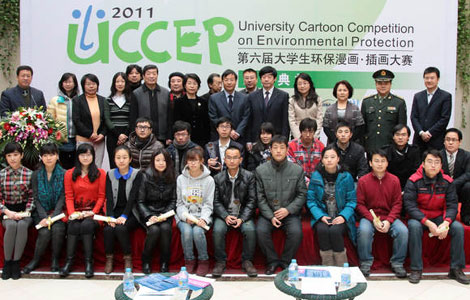Organic farming experiment could revitalize China's countryside
Updated: 2012-01-06 16:10
(Xinhua)
|
|||||||||||
BEIJING - Although she grew up in the posh city of Hangzhou in eastern China, Luo Yi has opted to settle down on a farm in a northern suburb of Beijing.
The 23-year-old woman graduated from college last year with a journalism degree. She was won over by the Little Donkey Farm's organic farming concept and community supported agriculture (CSA) model, and now she spends her days watering vegetables, making pickles, and learning needlework
"I also had never lived in the countryside, and was quite curious about farm life," she said.
While a large number of rural youths have abandoned the traditional farming lifestyle in order to move to cities for more work opportunities, some young people from cities have looked to the countryside for an alternative lifestyle or a new career path.
"I really enjoy the simplicity of life here," Luo said, adding that she thinks life in the countryside is a good escape from the consumerism-driven lifestyle found in cities.
"I used to love shopping, especially for clothes and electronics. But since I came to live here, I have started realizing that I don't need those things that much."
She has stopped using her mobile phone and no longer shops for new clothes. Instead, she has learned to alter her old clothes into new styles, and she exchanges clothes with her female colleagues at the farm.
"My parents strongly opposed my decision to work in the farm. Over the past few months, they have been shocked by the changes in my life, and they have gradually come to understand me," she said.
GOING BACK TO THE FARM
The Little Donkey Farm was founded three years ago by Shi Yan, a young agriculture scholar from Renmin University of China. Shi was inspired by her six-month experience as an apprentice at a CSA farm in Minnesota, United States.
Shi has applied the CSA model to her farm, which grows organic vegetables and sells them directly to individual consumers in Beijing.
Consumers can sign a year-long contract to purchase organic vegetables grown by the farm, and choose to either pick up their produce at various locations throughout the city or have the farm deliver it directly to their door. They can also rent a 30-square-meter plot at Shi's farm to do their own gardening.
More than 30 young people are currently working for the farm, most of whom are from the cities and had not farmed prior to coming here. They are working side-by-side with about 20 local villagers.
Wang Rui, a young apprentice, decided to join the farm after failing the national civil servant exam last year.
Inspired by the CSA model, he hopes to start his own farm in the future, so he came here to gather experience.
"There's an increasing need for organic food in cities. CSA farms not only provide urban residents with what they want but also help farmers raise income," Wang said. "This will be a promising career."
When the farm was established in 2009, only 37 clients placed annual orders and 17 rented their own plots. But now over 460 clients order vegetables and 260 lease land, said Huang Zhiyou, vice general manager of the farm.
"We have made ends meet, but do not seek profits like most farms. We would like to promote the idea of CSA and organic agriculture technologies," Huang said.
They are trying to introduce a new type of consumer-producer relationship that promotes more interaction between the two sides, he said.
Clients and their families are often invited to join harvest celebrations and festival functions, listen to lectures on farming and agriculture, or watch documentaries and films. The farm also receives visitors from across the country.
Huang, the 30-year-old father of a baby boy, has been working for the farm since it opened. His family lives on the farm with him and the only income they receive is from his salary, which is about 2,000 yuan (318 U.S. dollars) a month.
"It's a bit hard to live in the countryside, but I never regret my choice as both my work and life are rooted here," he said.
He sees the farm as an experiment in reforming and developing rural society.
"Despite rapid economic growth in China, rural areas have lagged far behind cities, making them less appealing to young people. Villages are becoming less and less vigorous," he said.
The farm can be a way to revitalize the countryside, he said.
"Organic farms, which provide more income for farmers, might attract migrant workers to come home and return to farming. The farm is also a way for urban residents to learn more about rural areas and farming," he said.
According to the Rural Reconstruction Center under Renmin University, experimental projects like the Little Donkey Farm have been founded in 14 provinces in China and about 100,000 college students have taken part in rural development programs, including organic agriculture, eco-friendly architecture in rural areas and rural education.
Related Stories
Food safety concerns drive Chinese back to the farm 2011-05-02 10:36
Student finds roots on the farm 2010-11-19 06:51
Food safety concerns drive Chinese back to the farm 2011-05-02 10:30
Illegal organ deals strike fear into Chinese hearts 2011-06-08 15:03
Police crack underground organ-trade ring 2011-10-26 20:36
- Bond issues up 52% in 2011 as market develops
- China Telecom to start UK service
- Officials weighing green benefits of carbon tax
- Net buyers required to register names, ID numbers
- Lifting consumption top priority for 2012
- Weak export hits 2011 trade surplus
- Yuan expected to rise more this year
- 'Time to diversify' crude sources









